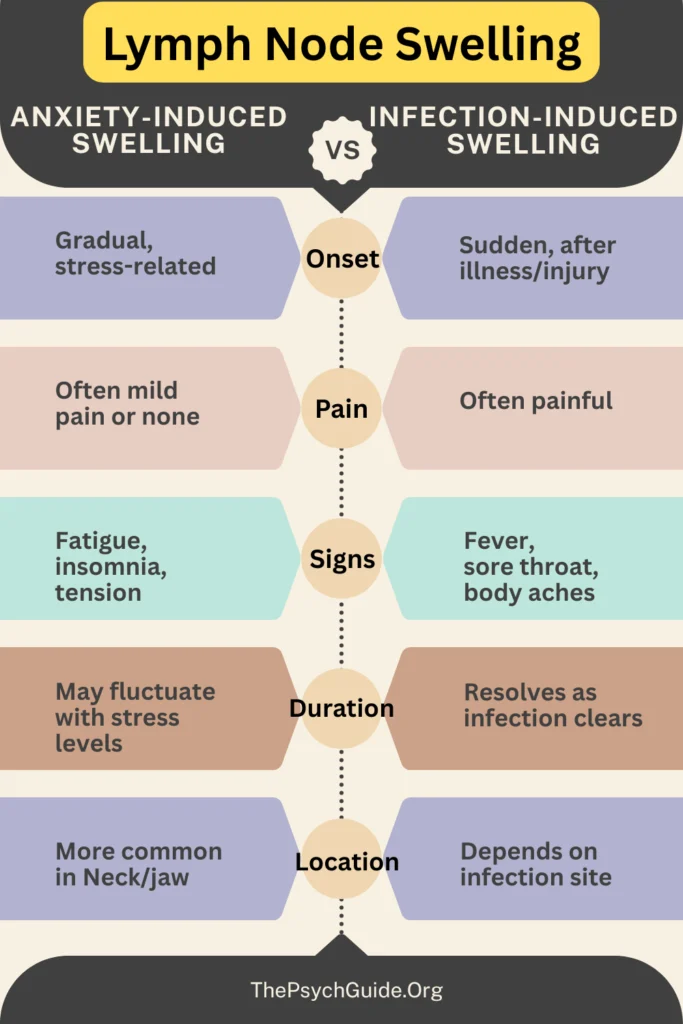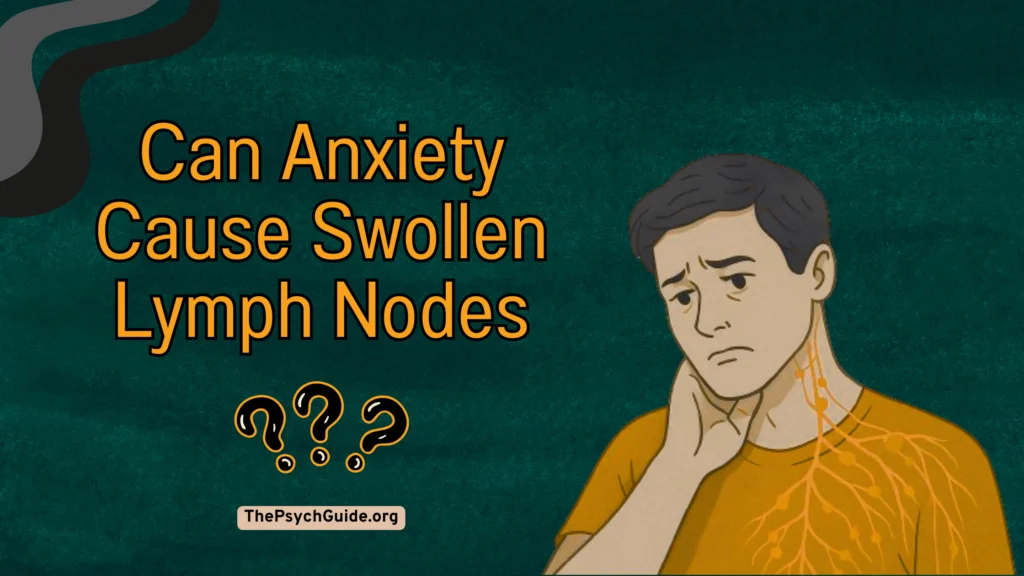Have you ever been so anxious that your chest tightened, your thoughts raced, and then out of nowhere, you noticed a swollen lump in your neck or under your jaw? Panic sets in. Your mind jumps to the worst. You Google it and the question arises: Can anxiety cause swollen lymph nodes?
You’re not imagining things. The mind and body are deeply connected, and when you’re under emotional strain, your body can show it in unexpected ways. Anxiety isn’t just in your head, it can manifest physically. And yes, in some cases, that may include swollen lymph nodes.
This is especially true if you’re dealing with subconscious anxiety or experiencing silent anxiety attacks, conditions where your body reacts even before your mind fully registers it.
In this blog post, we’ll gently walk you through this lesser-known connection. You’ll learn what swollen lymph nodes really mean, how anxiety might be affecting them, and what steps you can take to feel better, both mentally and physically. If you’ve been scared, confused, or overwhelmed by your symptoms, you’re not alone. Let’s get through this together.
Table of Contents
ToggleWhat Are Swollen Lymph Nodes?
Lymph nodes are small glands in the shape of bean that are found all over your body; in places like your armpits, neck and groin. They’re part of your immune system and help filter out viruses, bacteria, and other harmful substances.
When these nodes swell, it usually means your body is fighting something like an infection, inflammation, or sometimes even stress. These swollen lumps, medically called lymphadenopathy, are often tender or painful and can be accompanied by other symptoms.

Symptoms of Swollen Lymph Nodes
Here are 10 common symptoms you might notice:
- Tender or Painful Lumps – Often under your neck, jaw, armpits, or groin.
- Warmth Around the Area – Skin may feel hot due to inflammation.
- Visible Swelling – Noticeable bulge or bump.
- Sore Throat – Especially if the neck lymph nodes are swollen.
- Fever – When swelling is caused by infection.
- Fatigue – Your body may feel drained. (Learn more about how anxiety can cause tiredness.)
- Night Sweats – Especially in persistent or serious conditions.
- Redness or Skin Changes – Swollen area may look irritated.
- Difficulty Swallowing – If neck nodes are affected.
- Unexplained Weight Loss – Rare but serious that needs medical attention.
- Also helpful: Signs of High-Functioning Anxiety
Can Anxiety Cause Swollen Lymph Nodes? Here’s How It Happens
So, let’s return to our big question: Can anxiety cause swollen lymph nodes?
The answer? Yes but indirectly. While anxiety isn’t the root cause like an infection would be, it can lead your body into a state where swollen lymph nodes are more likely.
Here’s how:
- Anxiety triggers your body’s fight-or-flight response.
- This causes inflammation, immune changes, and muscle tension.
- These effects can lead to swollen lymph nodes even when there’s no infection.
Several studies back this up. A 2016 study found that chronic stress changes the lymphatic system, making it easier for diseases like cancer to spread. In 2023, researchers discovered that stress raises a chemical (CCL5) in lymph nodes, a marker linked to anxiety.
These findings reinforce how deeply our emotional health can impact our physical systems.

How Anxiety Might Be Affecting Your Lymph Nodes
Let’s break it down further. Here are the key reasons anxiety may lead to this physical symptom:
- Weakened Immune System
Chronic anxiety releases high levels of cortisol. Over time, this weakens your immune response, leaving your lymph nodes working overtime. - Increased Inflammation
Stress and anxiety often cause low-level inflammation, which can irritate the lymphatic system. - Frequent Minor Infections
Poor sleep, low immunity, or unhealthy habits linked to anxiety can make you catch colds more often, which means more work for your lymph nodes. - Heightened Body Awareness
When you’re anxious, you’re hyper-aware of your body. A small lump may suddenly feel huge and terrifying, even if it’s not. - Stress-Induced Muscle Tension
Tight neck or jaw muscles from stress can push or irritate nearby lymph nodes, making them feel swollen or sore. Related symptoms can also show up as muscle pain from anxiety.

Other Causes of Swollen Lymph Nodes
Not all lymph node swelling is related to stress. Common causes include:
- Viral or bacterial infections (cold, flu, or sore throat)
- Ear or tooth infections
- Skin wounds or abscesses
- Autoimmune diseases like lupus or rheumatoid arthritis
- Allergies
- Some medications
- Cancer (lymphoma, leukemia)
- STIs like HIV
- Inflammatory diseases (e.g., sarcoidosis)
Preventing Swollen Lymph Nodes
You can reduce your chances of developing swollen glands with a few simple habits:
- Maintain good hygiene to prevent infections.
- Treat cuts or skin infections quickly.
- Eat a balanced, anti-inflammatory diet.
- Stay up-to-date on vaccinations to avoid illnesses.
- Stay hydrated.
- Exercise regularly.
- Manage stress through relaxation techniques.
- Get enough sleep.
- Avoid smoking or excess alcohol.
- Schedule regular checkups.
How to Treat Anxiety-Induced Swollen Lymph Nodes
If anxiety seems to be triggering your symptoms, don’t panic as there are ways to manage both the stress and the swelling.
- Practice Relaxation Techniques
Deep breathing, meditation, and journaling can help calm your nervous system and reduce inflammation. - Hydrate Well
Water keeps your lymphatic system running smoothly, helping it flush out toxins and reduce swelling. - Use a Warm Compress
Gently applying heat to the area may soothe discomfort and increase blood flow. - Try Lymphatic Massage
Gentle circular motions can stimulate the lymphatic response to anxiety, encouraging drainage and helping reduce swelling. - Eat an Anti-Inflammatory Diet
Load up on greens, berries, nuts, and omega-3s. Avoid sugar and processed foods. - Sleep More (and Better)
Aim for 7–9 hours of rest. Your immune system repairs itself while you sleep. - Try OTC Anti-Inflammatories
Ibuprofen or naproxen may reduce discomfort temporarily but don’t rely on them long-term. - Get Therapy for Anxiety
CBT or other counseling approaches can teach you coping strategies that address both emotional stress and physical symptoms - Stay Active
Light exercise boosts endorphins and supports healthy lymph flow. - Talk to a Doctor
If swelling doesn’t improve or comes with fever, weight loss, or severe fatigue so get it checked.
Therapy Platforms That Can Help
If you’re feeling overwhelmed, here are trusted online therapy providers:
- Online-Therapy.com: Offers CBT-based structured support.
- BetterHelp: Easy access to licensed therapists via chat, phone, or video.
- Brightside Health: Combines psychiatric and therapy care for anxiety and depression.
Conclusion: Can Anxiety Cause Swollen Lymph Nodes?
So, can anxiety cause swollen lymph nodes? Yes, though indirectly. Anxiety can trigger body-wide stress responses, weaken immunity, and cause low-level inflammation. These changes make it easier for your lymph nodes to react, even without infection.
What does that mean for you? It means that your mental health matters not just for your mood, but for your physical well-being too. The more you care for your emotional state, through mindfulness, rest, and support, the more resilient your body becomes.
If you’re experiencing stress-related swollen glands or it is affecting your life, reach out for help. Managing anxiety could not only ease your mind but also protect your body.
Read next:
Frequently Asked Questions (FAQs)
Can anxiety cause swollen lymph nodes?
Yes, anxiety can indirectly cause swollen lymph nodes by weakening your immune system and increasing inflammation.
How are anxiety and swollen glands connected?
Stress hormones like cortisol suppress your immune system, which can lead to reactive swelling in lymph nodes.
Are swollen glands a common symptom of anxiety?
They’re not among the most common, but can occur in some individuals sensitive to stress-related changes.
How long do anxiety-related swollen lymph nodes last?
They often resolve once anxiety and stress levels are managed. Persistent swelling should be examined by a doctor.
Can anxiety cause swollen lymph nodes without an infection?
Yes, anxiety can cause swollen lymph nodes even without an infection, uncommonly known as anxiety lymph nodes, as stress can trigger inflammation and immune system responses.
Have you ever experienced swollen lymph nodes during a stressful time? Share your experience in the comments. It might help someone else feel less alone.

